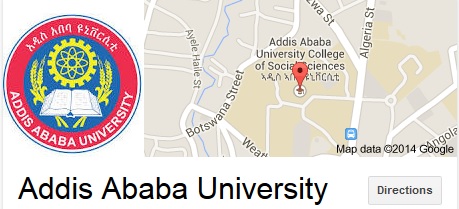Overview in Psychology
Prior to its establishment as a fully-fledged department, courses were offered in the areas of measurement and evaluation, educational psychology, developmental psychology, and counseling psychology to students of various departments under the former Haile Sellassie I University. In 1962, following the establishment of the Faculty of Education, the “Department of Psychology” was officially established with emphasis on Guidance and Counseling and with the aim to train counselors. In 1966, a minor program was initiated in Psychology and owing to the emphasis given to counseling at the time, the name of the Department was changed to “Department of Educational Psychology”. In 1974, the Department started its first (four-year) UG degree program, with Psychology as the major field of study with the understanding that the country at the time demanded trained human power and qualified professionals in guidance and counseling. In 1977, in recognition of the fact that the field of Psychology is too diverse and broad, the Department was renamed as “Department of Psychology’ and was placed within the College of Social Sciences. In 1984, the name of the Department was again changed to the Department of Educational Psychology and was put under the Faculty of Education. In 1999, the name of the Department was changed yet again to the Department of Psychology as a result of consensus reached with stakeholders and inline with the recommendations of a review committee organized for the purpose. In 2010, the Business Process Reengineering Implementation Steering Committee formed by the Addis Ababa University administration upgraded the Department to an Institute level after a thorough examination of the status of the Department and in recognition of the breadth of the program, the number of students served, and the number of faculty. Operating as an Institute for nearly two years, there appeared in the University a general revisit of the BPR structure, as a result of which the Institute came to be known as “the School of Psychology,” which is its current name.
The School of Psychology is now housed under the College of Education and Behavioral Studies. It is one of the largest academic units in Addis Ababa University in terms of the number of faculty, student population, and programs. With regard to faculty, it has 3 full Professors, 5 Associate Professors, 9 Assistant Professors, and 20 Lecturers, including those on study leave.It boastsa population of 885students. In terms of programs, it has one undergraduate (both regular and evening extension)program, six MA programs (four of which are also offered in the evening extension modality), and two PhD programs.
The School is in the process of opening additional doctoral programs particularly in psychometrics and counseling psychology.
Vision of the School of psychology
Developing Psychology as a discipline with professional and ethical excellence to build a healthy and vibrant society; improving quality of education; transforming the society, and improving the overall development of Ethiopia.
Mission of the School of Psychology
Offering quality education supported by state-of-the- art educational support; conducting applied research to solve societal problems; offering professional and community services whereby the academic community of the School could effectively translate the principles of psychology as catalyst towards the overall development of Ethiopia.
Goals of the School of Psychology
- Offer undergraduate training in psychology to students whowill subsequently become practitioners in educational, developmental, social, organizational and other settings;
- Offer graduate training in Measurement and Evaluation and Educational Psychology to students whowill subsequently become instructors and researchers in Universities and Teacher Training Colleges across the country;
- Offer graduate training in Clinical, Counseling and Health Psychology to students who will subsequently become instructors and researchers in Universities and also practitioners in various health and health-related establishments;
- Provide state-of-the-art instructional and research materials/ services and invigorate the intellectual climate to enable instructors, students, and collaborators to fulfill their potential as excellent academicians, researchers, and practitioners through the promotion of excellence in experiential learning;
- Have a well-equipped psychological laboratory in different fields of psychology that provides support in the preparation of competent academics, researchers and practitioners in the area of psychology;
- Ensure quality of instruction/ education through the use of standardized tests for selection, placement, formative, and summative purposes;
- Develop, acquire, and adapt standardized tests for assessing different learning needs of Ethiopian children and to use them for the purposes of identification, intervention and research;
- Promote collaborative and quality (basic, applied, and action) research in psychology that would help customize existing knowledge and/ or discovering new psychological knowledge, use this knowledge as a base to offering professional support to individuals, organizations, groups, communities, and institutions through consultancy services;
- Set standards to provide psychological services through the provision of high quality, customized and tailored short-term training to individuals, private companies, government institutions, international and local nongovernmental organizations and business communities;
- Create forums for the exchange of knowledge in psychology, influence the direction of psychology in Ethiopia, and make psychological literature available to scholars and students in Ethiopia;
- Ensure the integrity and credibility of psychology (as a profession) and protect human subjects from harm unleashed by unethical research, and enable psychology to extend its services to the wider community;
- Assist students, faculty/staff and alumni to establish their short and long term career goals by offering a variety of services like career exploration, organizing/facilitation of venues for students to meet potential employers, internships, job search skills and availing themselves of career information resources;
- Confer awards, prizes, grants, medals, scholarships, gifts, and bestow honors on deserving professional achievements which include excellence in teaching, distinction in academic achievement, merit in research outputs and / or worth in community contribution;
- Develop and implement a corporate communication strategy that guarantees a smooth flow of information among the community of the Institute and to provide valid and up-to-date information to stakeholders and external parties through print and electronic /digital media with amenities for systematic recording, methodical archiving, and effortless retrieval.







